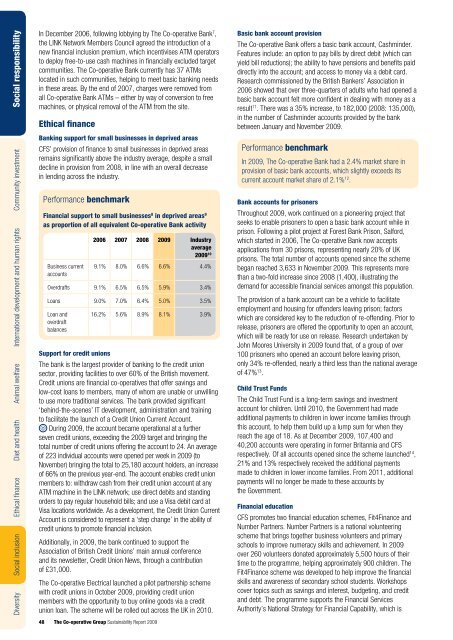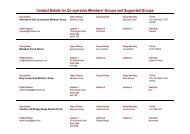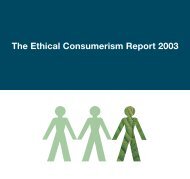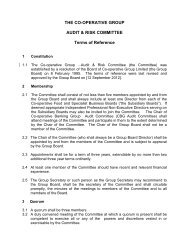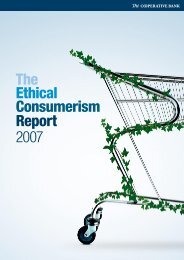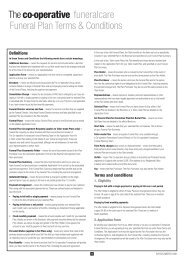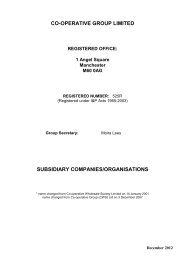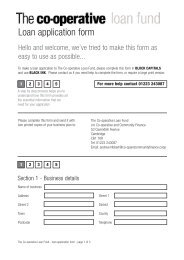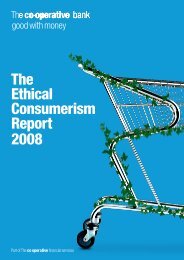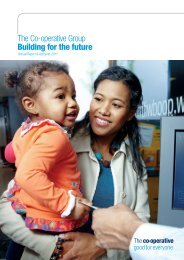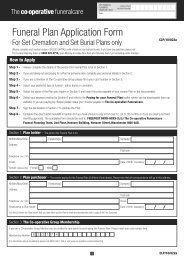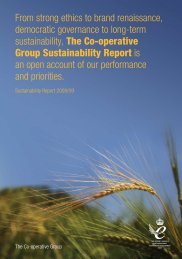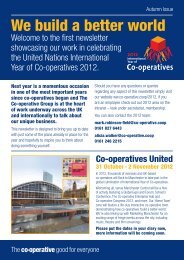Sustainability Report 2009 - The Co-operative
Sustainability Report 2009 - The Co-operative
Sustainability Report 2009 - The Co-operative
Create successful ePaper yourself
Turn your PDF publications into a flip-book with our unique Google optimized e-Paper software.
Diversity Social inclusion Ethical finance Diet and health Animal welfare International development and human rights <strong>Co</strong>mmunity investment Social responsibility<br />
In December 2006, following lobbying by <strong>The</strong> <strong>Co</strong>-<strong>operative</strong> Bank 7 ,<br />
the LINK Network Members <strong>Co</strong>uncil agreed the introduction of a<br />
new financial inclusion premium, which incentivises ATM operators<br />
to deploy free-to-use cash machines in financially excluded target<br />
communities. <strong>The</strong> <strong>Co</strong>-<strong>operative</strong> Bank currently has 37 ATMs<br />
located in such communities, helping to meet basic banking needs<br />
in these areas. By the end of 2007, charges were removed from<br />
all <strong>Co</strong>-<strong>operative</strong> Bank ATMs – either by way of conversion to free<br />
machines, or physical removal of the ATM from the site.<br />
Ethical finance<br />
Banking support for small businesses in deprived areas<br />
CFS’ provision of finance to small businesses in deprived areas<br />
remains significantly above the industry average, despite a small<br />
decline in provision from 2008, in line with an overall decrease<br />
in lending across the industry.<br />
Performance benchmark<br />
Financial support to small businesses 8 in deprived areas 9<br />
as proportion of all equivalent <strong>Co</strong>-<strong>operative</strong> Bank activity<br />
Business current<br />
accounts<br />
2006 2007 2008 <strong>2009</strong> Industry<br />
average<br />
<strong>2009</strong> 10<br />
9.1% 8.0% 6.6% 6.6% 4.4%<br />
Overdrafts 9.1% 6.5% 6.5% 5.9% 3.4%<br />
Loans 9.0% 7.0% 6.4% 5.0% 3.5%<br />
Loan and<br />
overdraft<br />
balances<br />
16.2% 5.6% 8.9% 8.1% 3.9%<br />
Support for credit unions<br />
<strong>The</strong> bank is the largest provider of banking to the credit union<br />
sector, providing facilities to over 60% of the British movement.<br />
Credit unions are financial co-<strong>operative</strong>s that offer savings and<br />
low-cost loans to members, many of whom are unable or unwilling<br />
to use more traditional services. <strong>The</strong> bank provided significant<br />
‘behind-the-scenes’ IT development, administration and training<br />
to facilitate the launch of a Credit Union Current Account.<br />
During <strong>2009</strong>, the account became operational at a further<br />
seven credit unions, exceeding the <strong>2009</strong> target and bringing the<br />
total number of credit unions offering the account to 24. An average<br />
of 223 individual accounts were opened per week in <strong>2009</strong> (to<br />
November) bringing the total to 25,180 account holders, an increase<br />
of 66% on the previous year-end. <strong>The</strong> account enables credit union<br />
members to: withdraw cash from their credit union account at any<br />
ATM machine in the LINK network; use direct debits and standing<br />
orders to pay regular household bills; and use a Visa debit card at<br />
Visa locations worldwide. As a development, the Credit Union Current<br />
Account is considered to represent a ‘step change’ in the ability of<br />
credit unions to promote financial inclusion.<br />
Additionally, in <strong>2009</strong>, the bank continued to support the<br />
Association of British Credit Unions’ main annual conference<br />
and its newsletter, Credit Union News, through a contribution<br />
of £31,000.<br />
<strong>The</strong> <strong>Co</strong>-<strong>operative</strong> Electrical launched a pilot partnership scheme<br />
with credit unions in October <strong>2009</strong>, providing credit union<br />
members with the opportunity to buy online goods via a credit<br />
union loan. <strong>The</strong> scheme will be rolled out across the UK in 2010.<br />
Basic bank account provision<br />
<strong>The</strong> <strong>Co</strong>-<strong>operative</strong> Bank offers a basic bank account, Cashminder.<br />
Features include: an option to pay bills by direct debit (which can<br />
yield bill reductions); the ability to have pensions and benefits paid<br />
directly into the account; and access to money via a debit card.<br />
Research commissioned by the British Bankers’ Association in<br />
2006 showed that over three-quarters of adults who had opened a<br />
basic bank account felt more confident in dealing with money as a<br />
result 11 . <strong>The</strong>re was a 35% increase, to 182,000 (2008: 135,000),<br />
in the number of Cashminder accounts provided by the bank<br />
between January and November <strong>2009</strong>.<br />
Performance benchmark<br />
In <strong>2009</strong>, <strong>The</strong> <strong>Co</strong>-<strong>operative</strong> Bank had a 2.4% market share in<br />
provision of basic bank accounts, which slightly exceeds its<br />
current account market share of 2.1% 12 .<br />
Bank accounts for prisoners<br />
Throughout <strong>2009</strong>, work continued on a pioneering project that<br />
seeks to enable prisoners to open a basic bank account while in<br />
prison. Following a pilot project at Forest Bank Prison, Salford,<br />
which started in 2006, <strong>The</strong> <strong>Co</strong>-<strong>operative</strong> Bank now accepts<br />
applications from 30 prisons, representing nearly 20% of UK<br />
prisons. <strong>The</strong> total number of accounts opened since the scheme<br />
began reached 3,633 in November <strong>2009</strong>. This represents more<br />
than a two-fold increase since 2008 (1,400), illustrating the<br />
demand for accessible financial services amongst this population.<br />
<strong>The</strong> provision of a bank account can be a vehicle to facilitate<br />
employment and housing for offenders leaving prison; factors<br />
which are considered key to the reduction of re-offending. Prior to<br />
release, prisoners are offered the opportunity to open an account,<br />
which will be ready for use on release. Research undertaken by<br />
John Moores University in <strong>2009</strong> found that, of a group of over<br />
100 prisoners who opened an account before leaving prison,<br />
only 34% re-offended, nearly a third less than the national average<br />
of 47% 13 .<br />
Child Trust Funds<br />
<strong>The</strong> Child Trust Fund is a long-term savings and investment<br />
account for children. Until 2010, the Government had made<br />
additional payments to children in lower income families through<br />
this account, to help them build up a lump sum for when they<br />
reach the age of 18. As at December <strong>2009</strong>, 107,400 and<br />
40,200 accounts were operating in former Britannia and CFS<br />
respectively. Of all accounts opened since the scheme launched 14 ,<br />
21% and 13% respectively received the additional payments<br />
made to children in lower income families. From 2011, additional<br />
payments will no longer be made to these accounts by<br />
the Government.<br />
Financial education<br />
CFS promotes two financial education schemes, Fit4Finance and<br />
Number Partners. Number Partners is a national volunteering<br />
scheme that brings together business volunteers and primary<br />
schools to improve numeracy skills and achievement. In <strong>2009</strong><br />
over 260 volunteers donated approximately 5,500 hours of their<br />
time to the programme, helping approximately 900 children. <strong>The</strong><br />
Fit4Finance scheme was developed to help improve the financial<br />
skills and awareness of secondary school students. Workshops<br />
cover topics such as savings and interest, budgeting, and credit<br />
and debt. <strong>The</strong> programme supports the Financial Services<br />
Authority’s National Strategy for Financial Capability, which is<br />
48<br />
<strong>The</strong> <strong>Co</strong>-<strong>operative</strong> Group <strong>Sustainability</strong> <strong>Report</strong> <strong>2009</strong>


